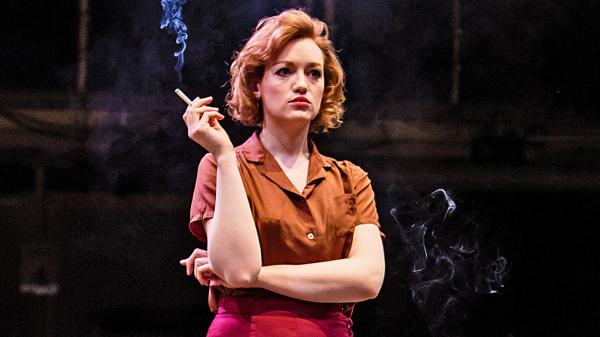The Night Watch at the Royal Exchange, Manchester
reviewed for The Times, 26th May 2016

Image credit- The Times
Lucy Briggs-Owen enthrals as the femme fatale Julia in The Night Watch.
![]()
Theatregoers bustle in the lobby of the Royal Exchange as booms of the Blitz echo portentously from the sound system. At the interval, a uniformed air-raid warden strides past with a bell to warn us to take shelter again in the central pod of the Exchange’s theatre space. More like the prelude to a drab tour of a cut-price heritage centre, it’s a poor advertisement for the lyrical, bittersweet stories of wartime love unearthed in Rebecca Gatward’s production of Sarah Waters’s The Night Watch.
Waters’s absorbing 2006 novel set out to put forbidden sexual subcultures back into our memory of the Blitz. That didn’t just mean same-sex desire: young Duncan’s transactional relationship with an older man is problematic by anyone’s standards, while his sister Viv is enduring an equally exploitative affair with a married man.
As a novel, The Night Watch worked as a fragmented, elliptical set of stories, the links between them only clarified in the second half. Hattie Naylor’s adaptation gets the elliptical bit all right, but in the transition to theatre we’re not always invested enough in the fragments to last until the pace builds in the second act.
That the second act does deliver a punch is down to a trio of emotionally compelling performances, especially from Jodie McNee as the heartbroken, heroic ambulance driver Kay. Lucy Briggs-Owen enthrals as the femme fatale Julia; Kelly Hotten manages to invest neurotic Helen, last of this love triangle, with hard-won sympathy.
It helps that this is the section of story set in the war years. An act of memory, the first act introduces us to our characters’ postwar, broken lives; the second spins backwards to show us how they got there. There’s nothing like a few bombs dropping to ramp up the pressure.
The initial lack of atmosphere owes something to Georgia Lowe’s barren set, but she has a tough job in the Exchange’s industrial, 360-degree amphitheatre. If you’re seated in the circle — supposedly the best seats — you’ll look down, aloof, on characters revolving like the conveyer belt at a sushi restaurant. Gatward’s production may pick up pace later in the run, but with such a superb cast one can’t help but want to get closer to the heart of it.






